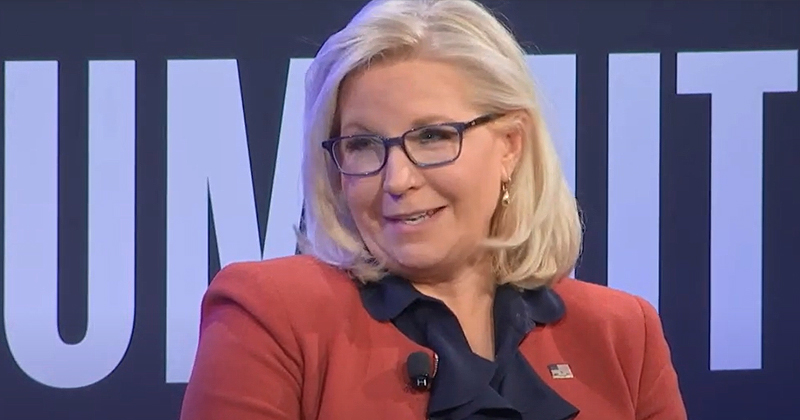
Cheney Joins WaPo Global Women’s Summit
WASHINGTON, DC – Liz Cheney was interviewed by Paul Kane at the Washington Post’s 2022 “Global Women’s Summit” and discussed the 2022 midterms, the work of the January 6th Select Committee, the future of the Republican Party, and more. Watch the video of the event here and see below for a full transcript of the conversation:
PAUL KANE: All right. Good morning, everybody. I’m Paul Kane. I’m a senior congressional correspondent here for The Washington Post. I think we know who our next guest is, Liz Cheney. Let’s get, you know, right into it. Late last night, there was the final declaration of the Arizona governor’s race. Kari Lake lost. And a couple of weeks ago, when you had come out in support of her opponent, she put out a tweet saying thank you, thank you very much because she had spent so much time disparaging sort of the McCain-ites, the Cheney-Bush wing of the party. What–some people may not have seen your tweet. So, what did you clap back at her last night?
CONGRESSWOMAN LIZ CHENEY: You’re welcome.
KANE: And I’m not sure we’re ever supposed to reveal what happens backstage, but I did check, and her staff confirmed that it was the congresswoman’s idea, and she just was waiting and waiting be able to do that. But let’s talk overall about the midterms. You did something you’ve never done before in your life. You openly endorsed, and in some cases actually campaigned for Democrats. How did they–the people that you endorsed and campaigned for, what was the sort of overall record?
CONGRESSWOMAN CHENEY: I think four out of five prevailed. And I really–I looked at this election cycle very much as one where we had to make sure that we prevented election deniers from taking power, and especially in offices like secretary of State’s offices, governorships around the country. And I think the outcome was really heartening and very hopeful. I think we’re not at the end by any means of this long battle that we have underway. But if you think about the fact that we prevented people from taking office, who had said that they wouldn’t honor the outcome of elections, that’s not just sort of a victory for this cycle. But what that really means is that in 2024, the American people actually will get to choose their president, and that’s very important.
KANE: Is it even more heartening that some of these folks who were defeated, have conceded? People like–a guy like Doug Mastriano, in Pennsylvania, I still haven’t read the statement in full, but people who covered his campaign felt like it was an out of body experience reading his concession, because it was, you know, fullhearted.
CONGRESSWOMAN CHENEY: Yeah, yeah. I think–look, you know, I think what we saw, fundamentally, is that the American people, the American voters, are good and honorable and decent. They believe in democracy. They’re tired of the crazy, and they aren’t going to elect people who are only going to certify outcomes that they agree with. And all of that is really important, and a really important foundation moving forward.
KANE: I want to take you back to your first congressional campaign. It was August 2016. I flew out there. And we spent a Friday evening on a street corner a couple blocks from your parents’ high school in Casper, Wyoming. At that time, you told me that, quote, there’s no question that Trump is the better choice. You accurately said he will probably shake things up. You know, there’s no hindsight here. But what would–you know, if you can go back in time, and what would you say to yourself, what would you say to Paul Ryan, what would you say to Mitch McConnell? What–like, what did people do wrong six years ago, six and a half, seven years ago? Did they not appreciate the threat that he was?
CONGRESSWOMAN CHENEY: Certainly. I think that, you know, Donald Trump is very clearly a very dangerous man. I don’t think that we appreciated how dangerous he was. I think that post the election of 2020 and post January 6th, there’s absolutely no excuse and no defense. Nobody can now claim we don’t know how dangerous he is, because we’ve all watched it and lived through it.
KANE: For what it’s worth you–I pressed you on what a Dick Cheney-Donald Trump Republican was and you said you’re not a Dick Cheney Republican, you’re not a Donald Trump Republican, you are a Liz Cheney Republican, who is a strong constitutional conservative. Well, let’s talk about this House majority, assuming they’re at 217 right now, the Republicans. I assume one of those final four races will break their way. The Senate has stayed Democratic. There is still a Democratic president. What do you expect from this House GOP conference that, you know, you served as one of the leaders of for a few years? Is this–do they understand what happened? Or are we going to just see the hard march to the right?
CONGRESSWOMAN CHENEY: Well, I think that, first of all, I’d say it’s really important for everybody to understand it’s not–it’s not a game. The forces of Marjorie Taylor Greene and Paul Gosar inside the House Republican Conference are strong. The majority of the House Republican Conference does not believe the election was stolen, recognizes reality, but they right now seem to be a silent majority. And those forces who think that we can whitewash what happened on January 6th, who think that we can embrace insurrection, I mean, they’re following the lead of Kevin McCarthy.
KANE: What is your breakdown? I get this question a lot when I talk to groups of students, college professors, those types. You know, what is the breakdown of people inside the Republican conference who, A, publicly don’t support Trump, and then those that are sort of that quiet group?
CONGRESSWOMAN CHENEY: The vast majority is the–is the quiet group. I mean, the vast majority of members of the House Republican Conference, you know, are there because they believe in conservative principles and values and because they want to do the best they can to represent their constituents. That’s true of the majority of the Democrats, too. The majority of the members of the House of Representatives want to do the right thing and they’re there for the right reasons, and we ought to be able to recognize that even when we have policy disputes. Unfortunately, right now, those people who are very destructive and who have done things like espouse White supremacy and anti-Semitism have a stranglehold on Kevin McCarthy, and that means they’ve got a stranglehold on the conference. So, you know, it’s going to take I think, you know, a couple of cycles for us to break that stranglehold. But it is–it’s really dangerous and does not reflect the reality of who the vast majority of Republicans are, or the vast majority of Republican elected officials.
KANE: Do you want to tell the orange Jesus story from January 6th?
CONGRESSWOMAN CHENEY: Do I have a choice?
KANE: You told it publicly recently.
CONGRESSWOMAN CHENEY: Yeah. No, I mean, look, I was in the cloakroom, the Republican cloakroom on January 6th getting ready to deliver remarks against objections–explaining why, you know, it was unconstitutional to object to the electoral votes. And there were sheets of paper laid out on the desks against the wall in the cloakroom. And one of my colleagues, a number of my colleagues came in and they were signing their names. I asked the staff person, what are these? And she said to me, oh, those are objections. You know, technically only one member of Congress of the House objects, but we had many members who wanted to demonstrate that they were also objecting, so they came up with this idea, you could sign your name on these pieces of paper.
So as one of my colleagues came through, and I was sort of sitting down at the end working on a computer, he came through, and he signed each sheet for each state objection. And he said, as he was doing it, the things we do for the orange Jesus. And that was such a–I don’t know if he intended that I hear it, or you know, if he just couldn’t keep it in, but, you know, the notion that we were going to be basically doing something that was clearly unconstitutional just to placate Donald Trump.
KANE: Later tonight, I–you know, all signs point to a Mar-a-Lago announcement. Does he not really appreciate what happened last week? And do–does he? It seems, from our reading of all these different races, yes, that the Supreme Court abortion decision was big, but also there was a pretty clear rejection of the most MAGA candidates. You know what–is he–you know, get in–it’s hard for you to get inside his brain, but like, does he just not understand? And what percentage chance do you give that someone else can win?
CONGRESSWOMAN CHENEY: Well, this is certainly not the rollout I’m sure Donald Trump wanted for his announcement tonight. But, you know, it’s also not the first time he’s been totally detached from reality. I think, though, it’s also really important for people to look at what’s happening and what he’s doing, not just through a political lens, but through the basic facts of his total lack of fitness for office. He’s unstable. The January 6th Committee has laid out very clearly his direct and personal involvement in every aspect of the plan to overturn the last election. He’s, you know, someone who, knowing that the mob was armed, sent them to march on the Capitol to try to stop the count of electoral votes. And then while that bloody battle was underway at the Capitol, despite everyone around him pleading with him to tell the mob to stop and go home, he wouldn’t–he wouldn’t do it. He sat and watched it on television. So, there’s no question that he’s unfit for office. And I feel confident that he will never be president again.
KANE: Okay. One of–if you want to announce your own campaign, you’re free to do it here. These folks would appreciate it.
CONGRESSWOMAN CHENEY: Thanks
.
KANE: But looking at other people who are floating their names to run, where is the sort of line where you are sort of crossing–like Ron DeSantis had a big night in Florida, and there are some other candidates that are talking about this–in terms of where you could withstand them as president, or you would endorse against them? Where–you know, who out there is saying the right things?
CONGRESSWOMAN CHENEY: The way I look at it is not sort of through the lens of the horserace. And I think that the election that we’ve just been through really is an example and a message of sort of how we all ought to be conducting ourselves at this moment and thinking about what is right for the country and what the American people deserve and what we all deserve in terms of representation, but also, what we all should be demanding in terms of candidates who are worthy of this incredible trust that we place in them. And so I have not obviously, you know, planned to endorse any candidate here today. But I think that it would be really a useful exercise for everybody to sort of step back from the horserace for a while and sort of say, look, this country is facing huge challenges, and we have to elect people that we can trust to deal with those challenges, not people who, you know, are making political calculations at the expense of their constitutional obligations.
KANE: But is there–I think you have said in the past that anybody who voted against certifying is sort of–has disqualified themselves. So that’s the congressional crew. You know, what about some of the governors out there? Glenn Youngkin has sort of straddled the line between Trump world and then he went and campaigned pretty vigorously for Vega against Abigail Spanberger, and you won that one. Is that a case where a guy like Youngkin is kind of disqualifying himself?
CONGRESSWOMAN CHENEY: Look, I don’t want to go down the list here today. I will just say I think everybody really has to think carefully about whom we’re entrusting power with.
KANE: Okay. Let’s get to the committee. You’re–you know, we’re literally at that point where we’ve got days left in terms of the congressional calendar. What work is still being done by the January 6th Committee? How extensive is this final report going to be? And what happens to all of these documents? You know, you’re not going to–are you going to release every single thing? There’s lots of stuff that, you know, won’t be in the final report.
CONGRESSWOMAN CHENEY: So, we’re very hard at work, really around the clock in a combination of things. We’ve got interviews that are still underway. We have obviously work that’s going on, on the final report. And the report itself, you know, we really recognize and take seriously that it’s an historic document, historic record of the committee’s work. We’re very much guided by the language of the resolution that created the committee. And so the report will have in it chapters that address the topics that we addressed in our hearings. They will have–it will have chapters that address additional material and additional topics. There’s been some assertion that the committee is not going to, you know, produce information about the security failures. That’s just simply not true. It’ll be a comprehensive report. And in terms of sort of the disposition of the documents and the records, obviously, we’ll be bound by House rules in that regard. There have been a number of materials that have been shared with the committee that include law enforcement-sensitive information that, you know, obviously those will have to be very cautious about our responsibility with respect to those. But we believe the American people have the right to see the full record of our work.
KANE: What about the members that you–members of Congress themselves that you folks wanted to interview? What–there’s just not enough time, or there’s just not enough legal battles to go through in order to enforce that? Was that McCarthy and others?
CONGRESSWOMAN CHENEY: Well, I think–yeah, I mean, those members of Congress obviously don’t take seriously their obligation to comply with congressional subpoenas. I think it’ll be interesting to see what happens when they’re in charge and they attempt to issue subpoenas in a whole range of areas. And they’ll have to explain, you know, the hypocrisy of their unwillingness to comply. I think that the report will certainly indicate information that the committee has gathered with respect to the conduct of a number of those members. And ultimately, you know, the American people get to decide, you know, who represents them. And we want to make sure the American people have all the information.
KANE: So, will that–will some of that information be in the report, then, about those members?
CONGRESSWOMAN CHENEY: Yes, yes.
KANE: And presumably, it’ll be somewhat damning for some of them?
CONGRESSWOMAN CHENEY: The information will be in the report.
KANE: The information will be in the report. How much–do people–you have this deep appreciation for history. You said at one point, “I say this to my colleagues who are defending the indefensible, there will come a day when Donald Trump is gone, but your dishonor will remain.” How much do–how much does the average rank and file member of Congress appreciate their place in history and actually care about their own legacy?
CONGRESSWOMAN CHENEY: Well, I think that there’s sort of this human nature–and self-interest, you know, is something that every human being has–so maybe we have to separate out sort of how people look at their own political success from their place in history. And you know, I think that not enough members recognized or still recognize the gravity of this moment. And the tendency has been in too many cases, certainly on my side of the aisle, to sort of minimize it, to sort of say, look, this isn’t really our responsibility. We can bury our head in the sand, or we can minimize what happened and just hope for the best. And so I think there are not enough members who fully recognize that, you know, as members of Congress, we have a duty and an obligation, and we can’t be bystanders. Nobody can be a bystander. But the inclination to try to be a bystander, you know, goes to the highest levels of the Republican leadership in the Senate–and the Republican leadership in the House, it’s worse, you know, embracing Donald Trump. But our–truly the survival of the republic and the functioning of our–of our electoral system and the process really demands that people do their duty. And I think, for example, if after the House impeached Donald Trump in January of 2021, if the impeachment article had immediately gone to the Senate, and we had immediately had a trial, we would be in a very different position than we are today. And I think that decision that was made by a bunch of people to delay that trial until he was out of office, I think looking back will prove to have been a mistake of historic proportions.
KANE: Have you discussed that with Leader McConnell? I think we know the answer. What’s this–you’ve been on a tour that has sort of taken you to a lot of college campuses and you’ve told me at various points that seeing young women respond to you has been a real–a good verification of what you’ve been trying to do. What’s that been like?
CONGRESSWOMAN CHENEY: It’s really–it’s really important and it’s really moving. You know, I’m the mother of high school and college-aged kids, and some out of college. I have 17 kids. No. It sounded like a lot as I was saying it. I have five but it feels like 17 some days. But I just think that for young people today it’s clear if you look back certainly at the last couple of years, probably longer that our nation suffers from a lack of real–suffers from a lack of teaching of American history and conveying to young people this notion of you can’t be a bystander, and also, by the way, you can make all the difference. And being able to talk to them about if you look at the events between the election of 2020 and January 6th for example, it was really, you know, a little more than a handful of individuals who stopped a hugely grave constitutional crisis, and it was people who were in positions where they could stand up to Donald Trump and his allies and say, no, we’re not going to do that. And I think that’s a hugely important lesson. It’s also a really hopeful lesson out of what’s been a very dangerous time that individual Americans made the difference. And I think that’s–it’s an important thing to talk to young people about, and they really give me a lot of hope. And so I’ve loved the opportunity to speak with them.
KANE: When you gave your concession speech outside of Jackson in this sort of golden hour with the Tetons in the backdrop, you invoked Lincoln and how he basically lost several different times before he won. How–are you willing to lose multiple times, and how important is that?
CONGRESSWOMAN CHENEY: You know, I think everybody should study Lincoln. And one of the things–well, there are several things. Jon Meacham has a new Lincoln biography out, and I took a group of my daughters’ friends on Sunday on a tour of the Capitol, and we started at the Library of Congress and–because that’s where the boarding house was that Lincoln lived in when he was in Congress, and we followed Meacham’s book and walked the path that Lincoln walked every day when he went to work in the Capitol. And having the opportunity to study history that way is so important. There’s another wonderful Lincoln book by Ted Widmer called “Lincoln on the Verge,” and he says something about Lincoln that I think is crucial for all of us at this moment. He talks about Lincoln’s fundamental belief in our founding documents, and he says Lincoln, he really believed in the promise of our founding documents, and that belief made him dangerous to cynical politicians who just, you know, talked the talk. And that’s such an important concept of recognizing we’re not a perfect nation but we’re the most perfect nation that’s ever existed, and the founding documents in those principles is how we become a more perfect union. But they really mean something, and we really have to believe in them.
KANE: All right. Thank you, Congressman Cheney. Thanks so much everyone. And now we’re going to hand off to David Ignatius, an esteemed foreign affairs columnist.




